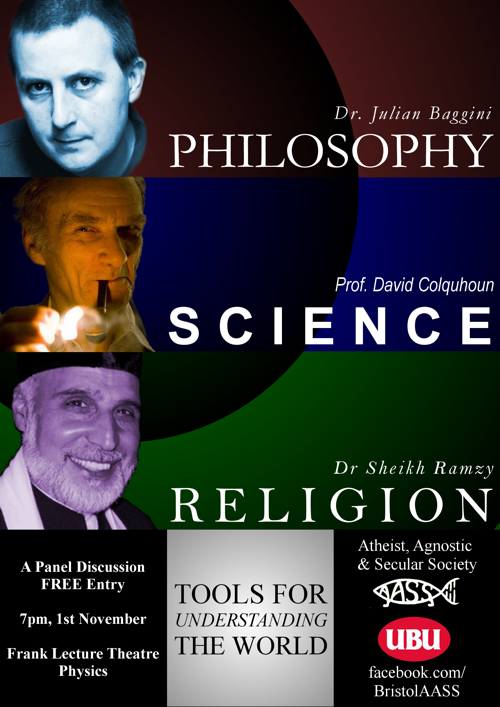Freedom of speech
This was the title of a meeting organised by the Bristol University Atheist Agnostic and Secular Society on 1st November. The meeting wasn’t recorded, but here is (more or less) what I said.
I’m not quite sure why I’m here, because the fantasies of religion seem to me much like the fantasies of quack medicine, not only morally offensive, but also simply boring. Fruitless speculations about the existence of gods is about as useful a way to spend time as fruitless speculations about whether there really are fairies at the bottom of your garden.
Of course people are free to believe in any daft thing they want, as long as it doesn’t harm anyone else. The problem is that daft beliefs about religion, just like daft beliefs about medicine, do harm other people. I suppose it’s my job to point out that neither religion nor philosophy are likely to allow you to understand the world, whereas science has, at least, got a chance of doing so. It has made a small start already.
What I like about science is that it is undogmatic. When the facts change you are forced to change your mind. If the facts contradict your theory, then your theory is wrong.
Very often, you have simply to say “I don’t know”. In contrast, religious people virtually never change their minds and very rarely say they “don’t know”. They invent pseudo-explanations, like “god did it”, for just about anything, and justify it with quotations from holy books. The holy books are so inconsistent, often downright weird, that you can pick a citation that justifies whatever your opinion was in the first place. You might as well cite a book of magic spells.
I’d maintain that philosophers of science have contributed very little of substance to the conduct of science, but I’ll miss that bit out because I wrote about it last week,.
Dr Baggini, among others, has claimed that the “new atheists” are too strident, and that they only antagonise moderate atheists (see The New Atheist Movement is destructive, though there is something of a recantation two years later in Religion’s truce with science can’t hold).
I disagree, for two reasons.
Firstly, people like Richard Dawkins are really not very strident. Dawkin’s book, The God Delusion, is quiet and scholarly. It takes each of the arguments put forward by religious people, and dissects them one by one. It’s true that, having done this, he sets forth his conclusions quite bluntly. That seems to me to be a good thing. If your conclusions are stifled by tortuous euphemisms, nobody takes much notice. Just as in science, simple plain words are best.
The second, and more important, reason that I like Dawkin’s approach is that I suspect it’s the only approach that has much effect. There is a direct analogy with my own efforts to stop universities giving BSc degrees in subjects that are not science. Worse, they are actively anti-science. Take for example, homeopathy, the medicine that contains no medicine. I started by writing polite letters to vice chancellors. Usually they didn’t even have the courtesy to reply. All efforts to tackle the problem through the “proper channels” failed. The only thing that has worked was public derision. A combination of internal moles and Freedom of Information Act requests unearthed what was being taught on these courses. Like Westminster’s assertion that “amethysts emit high Yin energy”. Disclosure of such nonsense and headlines like
“Professor Geoffrey Petts of the University of Westminster says they “are not teaching pseudo-science”. The facts show this is not true
are certainly somewhat strident. But they have worked. Forget the proper channels if you want results. Mock what deserves to be mocked.
Religion is often immoral
When a pair of besuited Mormons knock on the front door, there are two reactions. Most people hide under the kitchen table. I don’t. I invite them in. It usually goes something like this. “why don’t you believe in god?”. To which I respond, “I don’t believe in god on moral grounds. All religions that I have encountered teach immorality”
This response is greeted with incredulity and indignation. You may think, is a bit strong, so let’s have some examples. The bible says (amongst many contradictory things)
Deuteronomy , chapters 7 & 20. and Joshua, chapters 6, 8, 10, 11, 14, etc.: After wandering in the desert for four decades, God ordered the Hebrews to invade the "promised land" and totally exterminate "the Hittites, and the Amorites, the Canaanites, and the Perizzites, the Hivites and the Jebusites"leaving "alive nothing that breathes." They were to fight and kill the soldiers of these groups, and then murder the defenseless elderly, women, youths, children, infants, and newborns. The book of Joshua records the progress of the genocide, city by city:
Deuteronomy 21
20. And they shall say unto the elders of his city, This our son is stubborn and rebellious, he will not obey our voice; he is a glutton, and a drunkard.
21. And all the men of his city shall stone him with stones, that he die: so shalt thou put evil away from among you; and all Israel shall hear, and fear.
and the Koran says
“The woman and the man guilty of adultery or fornication—flog each of them with hundred stripes: Let no compassion move you in their case, in a matter prescribed by God, if ye believe in God and the last day.”[Quran 24:2] “
If these aren’t deeply immoral, I don’t know what is. This gratuitous cruelty isn’t just Old Testament either. This is what persuaded me that religion is bad.
When I was about 15 I went to a summer camp which turned out to be run by christian evangelists (my parents swore they didn’t realise that it was a brain-washing camp). I was converted and became rather earnest. Then, at 18, I met a nurse. Being on Merseyside, she was Irish. And being 18, I was rather interested in sex. The price of sex was to go with her to mass, so of course I went. It was Easter and they were doing the Twelve Stations of the Cross. I still recall watching this, with mounting horror. The priests were just enjoying it too much. It was almost like a sado-masochistic orgy. The priests seemed to be almost masturbating. It was simply sick. Quite revolting.
Once, after walking in the Dolomites, I wrote to the Italian Tourist Authority to complain that my holiday was spoiled because every time I got to the top of a mountain, I was greeted with a scene of graphic torture (a crucifix). It is very offensive to any normal human.
Of course, since then, it’s turned out that a large number of priests were not just enjoying the torture in their heads, but had been acting out their nasty fantasies through rape of real children. And that the Church (including the present pope) had gone to great lengths to conceal their activities from m the public and from the police.
The constant emphasis on guilt is horrible for adults. But telling happy young children that they are guilty sinners is obnoxious. It is a form of child abuse. And catholic schools that decorate classrooms with scenes of torture corrupt young minds. Indoctrinating children in one particular sect of one religion are not part of a civilized society. It promotes misunderstanding and prejudice between one child and another. This sort of divisive brainwashing is ghastly.
Ludicrously, when you pass 18, the law reverses itself. Up to the age of 18 you are encouraged by moral politicians (you know, like Blair and Gove) to promote religious segregation but once you pass 18, that sort of behaviour would, very properly, be illegal. The Universities Tests Act (1871) made it illegal for a university discriminate on grounds of religion, as governments actively encourage schools to do. (The Act was passed, of course, to bring Oxford and Cambridge up to the standards set by UCL in 1826.)
Then, of course, there is the church’s contribution to the spread of AIDS, by telling direct lies about condoms. The list goes on and on.
And these people want to tell us about morals? You must be joking.
When Napoleon mentioned to the great mathematician, Laplace, that God is not mentioned in the Me’chanique ce’leste, Laplace replied, " Sire, I did not need that hypothesis." When Napoleon later reported this reply to Lagrange, the latter remarked, "Ah, but that is a fine hypothesis. It explains so many things."
History doesn’t relate whether Lagrange’s comment was deeply ironical, but I like to think it was. It hits the nub of the problem. Religion explains nothing whatsoever, just muddles the ideas, and replaces one unknown with another.
At the time of the Reformation, Sir Thomas More was fond of burning heretics at the stake (merely possessing a bible in English was enough to get you tortured to death). .The protestants were no better, of course: they eventually decapitated More. But it won’t do to say that these things happened in the 16th century. In the 20th Century the pope declared the heretic-burner to be saint (one of the curious bits of make-believe that catholics seem to enjoy). Worse still, in 2000, Pope John Paul II declared Thomas More to be the “heavenly patron of statesmen and politicians” (whatever that means).
And of course it still goes on. Catholics and protestants kill each other. Sunnis and Shias kill each other. It’s characteristic of organisations whose beliefs are based on myths to be deeply aggrieved by people whose myths differ in some trivial detail. It happens in alternative medicine too. It’s all summed up in the "religious joke of the year".
I was walking across a bridge one day, and I saw a man standing on the edge, about to jump. I ran over and said: "Stop. Don’t do it."
"Why shouldn’t I?" he asked.
"Well, there’s so much to live for!"
"Like what?"
"Are you religious?"
He said, "Yes."
I said, "Me too. Are you Christian or Buddhist?"
"Christian."
"Me too. Are you Catholic or Protestant?"
"Protestant."
"Me too. Are you Episcopalian or Baptist?"
"Baptist."
"Wow. Me too. Are you Baptist Church of God or Baptist Church of the Lord?"
"Baptist Church of God."
"Me too. Are you original Baptist Church of God, or are you Reformed Baptist Church of God?""Reformed Baptist Church of God."
"Me too. Are you Reformed Baptist Church of God, Reformation of 1879, or Reformed Baptist Church of God, Reformation of 1915?"
He said: "Reformed Baptist Church of God, Reformation of 1915."
I said: "Die, heretic scum," and pushed him off.
In a nutshell, my objection to religion is that, with occasional honourable exceptions, it spreads immorality and violence.
Of course non-religious people can be just as immoral and violent, but, in the words of Stephen Weinberg:
"for good people to do evil things, it takes religion."
Is there hope for something better?
It’s pretty clear that as education spreads, religion dies. The process is well-advanced in the west, in every country apart from the USA, but in the USA religion is just another business, devoted to extracting money, mostly from the poor, and supporting the extreme right wing parties and military adventurism.
We shouldn’t be too smug about Islam either. Admittedly I was slightly taken aback when a second year undergraduate, on duty at an Islamic exhibition at UCL, told me that "when Islam came to power in the UK I would be executed" (and then asked for my name). But it’s little more than 100 years since we stopped whipping people and people were still being hanged in my lifetime. My guess is that in another few hundred years, Islam will catch up. It will become gradually less cruel and women will, bit by bit, come to be treated as human beings. But once that happens, Islam will start to die out altogether, just as Christianity has (almost) done in the West.
So, in the words of the atheist bus campaign.
"There is probably no God. Now stop worrying and enjoy your life."
Follow-up
In the questions after the talk, I was spurred into saying
Religion is what we had before the enlightenment
Here is a short break from the astonishing festival of chiropractic that has followed the British Chiropractic Association (BCA) v Simon Singh defamation case, and the absurd NICE guidance on low back pain.
|
Singh’s statement already has over 10000 signatories, many very distinguished, Sign it now if you haven’t already. And getting on for 600 separate complaints about exaggerated and false claims by chiropractors have been lodged with the General Chiropractic Council and with Trading Standards offices. |
The BCA has exposed the baselessness of most of chiropractic’s claims more effectively than any sceptic could have done.
The University of Westminster is seeing the light?
It is only recently that the University of Westminster suspended entry to degrees in homeopathy and remedial massage and neuromuscular therapy. Luckily for science, they have a new Dean who knows bullshit when she sees it. I suspect than she has been instrumental in starting to restore Westminster’s reputation. The job isn’t finished yet though. According to the UCAS site Westminster still offers
- Chinese Medicine: Acupuncture with Foundation (B341) 4FT Hon BSc
- Health Sciences: Complementary Ther with Foundn (B300) 4FT Hon BSc
- Health Sciences: Complementary Therapies (B255) 3FT Hon BSc
- Health Sciences: Herbal Medicine (B342) 3FT Hon BSc
- Health Sciences: Herbal Medicine with Foundation (B340) 4FT Hon BSc
- Health Sciences: Naturopathy (B391) 3FT Hon BSc
- Health Sciences: Naturopathy with Foundation (B392) 4FT Hon BSc
- Health Sciences: Nutritional Therapy (B400) 3FT Hon BSc
- Health Sciences: Nutritional Therapy with Foundn (B402) 4FT Hon BSc
With the possible exception of herbal medicine, which could be taught scientifically. all the rest is as delusional as homeopathy.
Rumour has it that Naturopathy may be next for the chop, so it seems appropriate to help the dean by showing a bit more of what the hapless students get taught. Remember that, according to Westminster, this is a bachelor of science degree!
Psychotherapeutic Approaches in Naturopathy 3CMW606
“This module is a core subject for BSc (Hons) Health Sciences: Naturopathy and option for BSc (Hons) Health Sciences: Complementary Therapies; BSc (Hons) Health Sciences: Therapeutic Bodywork; Graduate Diploma in Therapeutic Bodywork.”
Lectures 3 – 5 of this course are about the Theory and Application of EmoTrance.
EMOTRANCE? No I had never heard of it either. But it takes only two minutes with Google to discover that it yet another product of the enormous navel-gazing self-help industry. A new variant is born almost every day, and no doubt they make buckets of money for their inventors. You can download a primer from http://emotrance.com/. The web site announces.
“EmoTrance REAL energy healing for the 21st Century”
Here are three quotations from the primer.
|
And then I thought of the lady in the supermarket whose husband had died, and I spend the following time sending her my best wishes, and my best space time quantum healing efforts for her void. It doesn’t matter how “bad”; something is or how old, it is ONLY AN ENERGY and energy can be moved with consciousness in quantum time, easily, and just for the asking. Is EmoTrance a Science? |
Now back to Westminster
Here are a few slides about EmoTrance
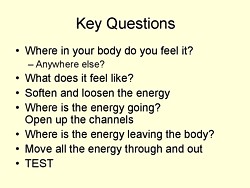
|
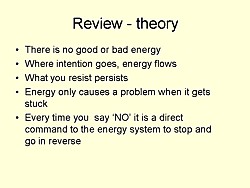
|

|
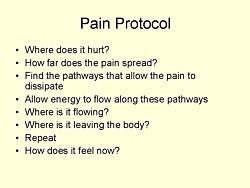
|
So it is pure vitalistic psycho-babble. The usual undefined use of impressive sounding words like “energy” and “quantum” with no defined meaning. Just preposterous made-up gobbledygook.
Before getting to EmoTrance, the course Psychotherapeutic Approaches in Naturopathy (3CMW606) had a lecture on Flower Essences. The evidence says, not surprisingly, that the effects of flower essences is not distinguishable from placebo “The hypothesis that flower remedies are associated with effects beyond a placebo response is not supported by data from rigorous clinical trials.” (See Ernst Wien. Klin. Wochenschr. 2002 114(23-24):963-6). Here are two of the slides.
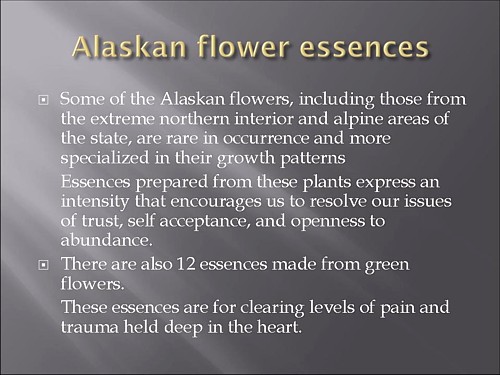
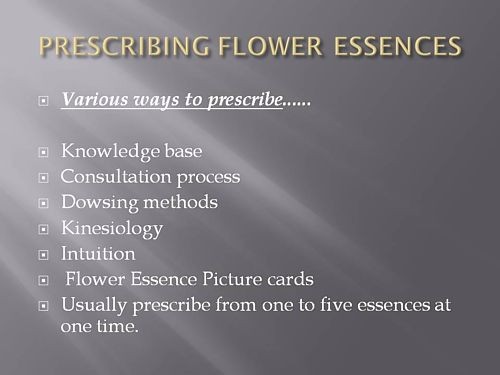
This last slide departs from the simply silly to the totally mad. Dowsing? Kinesiology?
Pendulums I’m told from more than one source that the use of pendulums is not uncommon. both in teaching and by students in the Westminster University polyclinic Apparently they provide an excellent way to choose a ‘remedy’ or make a diagnosis (well, I expect they are as good as the alternatives). If in doubt, guess.
Of course pendulums were popular with Cherie Blair who is reported to have taken her son Leo to a pendulum waver, Jack Temple, rather than have him vaccinated with MMR. At least her delusions affected fewer people than those of her husband (the latest Iraq body count is about 100,000).
Kinesiology was originally a word that applied to the perfectly sensible science of human movement. But Applied Kinesiology more often refers now to a fraudulent and totally ineffective diagnostic method invented by (you guessed) a chiropractor. It has been widely used by alternative medicine to misdiagnose food allergies. It does not work (Garrow, 1988: download reprint).
General Chiropractic Council It is a mind-boggling sign of the incompetence of the General Chiropractic Council that they manage to include kinesiology within their definition of “evidence based care”. Their definition is clearly sufficiently flexible to include anything whatsoever. The incompetence of the GCC is documented in superb detail on jdc325’s blog (James Cole).
Council for Healthcare Regulatory Excellence (CHRE) is yet another example of the network of ineffective and incompetent quangos that plague us.. It is meant to ensure that regulation is effective but utterly fails to do so. The CHRE is quoted as saying “[The GCC] takes its role seriously and aspires to, and often maintains, excellence.”. Like endorsing kinesiology and ‘craniosacral therapy’ perhaps? Quangos like the CHRE not only fail to ensure regulatory excellence, they actually endorse rubbish. They do more harm than good.
The reading list for the course includes the following books. I guess the vibrational medicine (whatever that means) was covered already in the now infamous ‘amethysts emit high yin energy‘ lectures.
Reading List
Essential:
Hartman S (2003) Oceans of Energy: The Patterns and Techniques of EmoTrance: Vol 1.DragonRising. ISBN: 1873483732.
Lynch V and Lynch P (2001) Emotional Healing in Minutes. Thorsons: London. ISBN: 0007112580Recommended:
Gerber R (2001) Vibrational Medicine for the 21st Century. Piatkus Publishers: London.
Gurudas (1989) Flower Essences and Vibrational Medicine. Cassandra Press: California, USA
Hartman S (2000) Adventures in EFT: The Essential Field Guide to Emotional Freedom Techniques. DragonRising. ISBN: 1873483635.
Hartman S (2004) Living Energy: The Patterns and Techniques of EmoTrance: Vol 2. DragonRising.ISBN: 1873483740.
Hartman S (2006) Energy Magic: The Patterns and Techniques of EmoTrance: Vol 3. Dragon Rising.ISBN: 1873483767.
Real magic.
Sylvia Hartman’s books seem to feature heavily in the reading list. I just got news of her latest effort
Welcome to a special update to the June 2009 newsletter to announce Silvia Hartmann’s latest book “Magic, Spells & Potions” is now available to pre-order from our site. The eBook edition will be released this Sunday, the most magical day of the year.
http://DragonRising.com/store/magic_spells_and_potions/?r=DR0609MSAP
If you do pre-order this exciting new book, not only will you be amongst the first to receive your copy, but you will also be entered into an exciting competition for Silvia Hartmann’s handmade copal amber magic pendant. Each paperback book pre-ordered will also be signed by the author and contain a unique blessing for the reader.
Because this is a serious book on real magic, potions and fortune telling if you are a beginner Silvia has provided ample sample spells and potions for you to practice working with before you start covering the advanced material.
What? No honestly, I didn’t invent that.
The idea that stuff of this sort is appropriate for a bachelor of science degree is simply ludicrous. I have no doubt that Westminster’s new dean can see that as well as anyone else. She has the delicate diplomatic job of extirpating the nonsense, I wish her well.
Follow-up
The battle for freedom of speech is under way.
| Simon Singh is a great science writer and communicator. He is author of The Big Bang, The Code Book, Fermat’s Last Theorem, and, with Edzard Ernst, Trick or Treatment. They are superb books (buy from Amazon). | 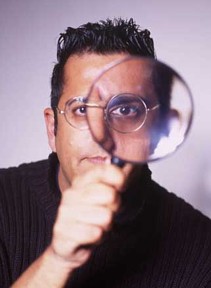 |
When Singh had the temerity to express an honest opinion, based on the evidence, about that very curious branch of alternative medicine known as chiropractic, the British Chiropractic Association sued Singh for defamation.This was their substitute for producing evidence for their bizarre claims.
Chiropractors seem to be particularly fond of litigation, perhaps because they are so short of evidence. Having had legal threats from them myself, I know how scary it can be, Luckily I was saved by a feisty a journal editor. Singh wasn’t so lucky. The history is recounted here,
The legal aspects of the case are being described by the lawyer who writes under the name of Jack of Kent. He has regular updates on progress.
Put briefly, Libel: A very expensive remedy, to be used only when you have no evidence. Appeals to alternative practitioners because truth is irrelevant
The iniquitous nature of England’s libel law has been described eloquently by Nick Cohen, in the Observer. It is used regularly by rogues and criminals from all over the world to silence their critics. All they need is money. Truth is irrelevant. It is a disgrace to a civilised country.
The cost of defamation cases in the UK is vastly greater than in any other country in Europe:: look at the graph.
With enormous courage, Simon Singh has decided to appeal against the ruling by Mr Justice Eady. Scientists and journalists everywhere should rally to support him, if they value the right to express an honest opinion without being bankrupted by a law court. Singh is taking a great risk on behalf of anyone who values freedom of speech.The charity, Sense abour Science (SaS), has started a campaign to Keep the Libel Laws out of Science.
Read the statement about the campaign on the SaS site, and the current list of signatories. The list of supporters is already very impressive. It includes, for example, professor Lord (Martin) Rees, president of the Royal Society and Astronomer Royal, to Dr Philip Campbell Editor-in-Chief of Nature, David Starkey Historian, Stephen Fry Broadcaster and Author and Baroness Helena Kennedy QC Barrister.
You can sign the statement yourself there. Do it. Now!
You can also get code for the button (above) to link your own web site to the campaign.
In 1894, a local Iowa newspaper, The Davenport Leader, wrote of the founder of chripractic, D.D. Palmer, thus.
“A crank on magnetism has a crazy notion hat he can cure the sick and crippled with his magnetic hands. His victims are the weak-minded, ignorant and superstitious, those foolish people who have been sick for years and have become tired of the regular physician and want health by the short-cut method he has certainly profited by the ignorance of his victim. His increase in business shows what can be done in Davenport, even by a quack.” [quoted in Rose
Shapiro’s book, Suckers]
Today, in the UK, no newspaper would dare to express an opinion like that.
We all hope that Singh will win the appeal. But even if he doesn’t win in the law courts, he will have scored an enormous moral victory. What’s more, chiropractic is now under scrutiny as never before. There is going to be a chiro-fest that will make the British Chiropractic Association rue the day that it decided to use legal bullying in place of reason.
They may even have signed their own death warrant.
Follow up will be posted here regularly
Follow-up
There is a good roundup of activity up to June 3rd here.
The Wall Street Journal (June 4th) discusses the case under the title Britain Chills Free Speech.
British Medical Journal editorial by Evan Harris (Lib dem member of parliament and doctor), Science in Court
Bait and switch. Oh dear, oh dear. Just look at British Chiropractic Association tell their members to hide their sins from prying eyes.
Excellent round-up of the recent outburst of writing about “chiroquacktic” (Tut, tut, is there no respect?).
Dr Crippen writes “NICE recommends a cure for all known disease” [Ed some exaggeration, surely]
| One of the most extraordinary bits of journalism I’ve read for a long time appeared as an editorial in the Sri Lankan newspaper, the Sunday Leader, on Sunday January 11th 2009 It was reproduced in the Guardian on 13th January, and in The Times. It was written by Lasantha Wickrematunge, editor of the Sunday Leader, and it was the last thing he wrote. Days after writing it he was assassinated. | 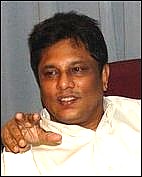 |
It is a plea for freedom of speech. In particular, for the freedom of journalists to tell the truth, It is deeply moving and it is also written in more beautiful English than many native speakers can manage. The second person to leave a comment in the Guardian said
“Extraordinary, humbling and deeply moving.
Cif Eds, please leave this at the top of the page for about a week, and then nail copies it to every available surface at Guardian HQ.”
Writing blogs like this one (and a thousand others) need some of the skills of investigative journalism. Those skills are not so different from those you need in science, Curiosity, a willingness to look under stones, a preference for truth over myth, some skill with Google and a good deal of tenacity. You also need to be resilient to abuse and defamation by people who disagree with you. But you do not risk your life. It does not take much courage. That isn’t true in large parts of the world.
Read it all. Here are a few quotations to persuade you it’s worth the time.
“No other profession calls on its practitioners to lay down their lives for their art save the armed forces – and, in Sri
Lanka , journalism. In the course of the last few years, the independent media have increasingly come under attack. Electronic and print institutions have been burned, bombed, sealed and coerced. Countless journalists have been harassed, threatened and killed. It has been my honour to belong to all those categories, and now especially the last.”“The Sunday Leader has been a controversial newspaper because we say it like we see it: whether it be a spade, a thief or a murderer, we call it by that name. We do not hide behind euphemism. The investigative articles we print
are supported by documentary evidence thanks to the public-spiritedness of citizens who at great risk to themselves pass on this material to us. We have exposed scandal after scandal, and never once in these 15 years has anyone proved us wrong or successfully prosecuted us.”“The free media serve as a mirror in which the public can see itself sans mascara and styling gel. From us you learn the state of your nation, and especially its management by the people you elected to give your children a better future.”
“It is well known that I was on two occasions brutally assaulted, while on another my house was sprayed with machine-gun fire. Despite the government’s sanctimonious assurances, there was never a serious police inquiry into the perpetrators of these attacks, and the attackers were never apprehended.
In all these cases, I have reason to believe the attacks were inspired by the government. When finally I am killed, it will be the government that kills me.”
“In the wake of my death I know you will make all the usual sanctimonious noises and call upon the police to hold a swift and thorough inquiry.
But like all the inquiries you have ordered in the past, nothing will come of this one, too. For truth be told, we both know who will be behind my death, but dare not call his name. Not just my life but yours too depends on it.
As for me, I have the satisfaction of knowing that I walked tall and bowed to no man. And I have not travelled this journey alone. Fellow journalists in other branches of the media walked with me: most are now dead, imprisoned
without trial or exiled in far-off lands.”“People often ask me why I take such risks and tell me it is a matter of time before I am bumped off. Of course I know that: it is inevitable. But if we do not speak out now, there will be no one left to speak for those who cannot,
whether they be ethnic minorities, the disadvantaged or the persecuted. An example that has inspired me throughout my career in journalism has been that of the German theologian, Martin Niemöller. In his youth he was an antisemite and an admirer of Hitler. As nazism took hold of Germany, however, he saw nazism for what it was. It was not just the Jews Hitler sought to extirpate, it was just about anyone with an alternate point of view. Niemöller spoke out, and for his trouble was incarcerated in the Sachsenhausen and Dachau concentration camps from 1937 to 1945, and very nearly executed. While incarcerated, he wrote a poem that, from the first time I read it in my teenage years, stuck hauntingly in my mind:
First they came for the Jews
and I did not speak out because I was not a Jew.Then they came for the Communists
and I did not speak out because I was not a Communist.Then they came for the trade unionists
and I did not speak out because I was not a trade unionist.Then they came for me and there was no one left to speak out for me.
If you remember nothing else, let it be this: the Leader is there for you, be you Sinhalese, Tamil, Muslim, low-caste, homosexual, dissident or disabled.”
This man puts to shame the those who won’t speak out in the safety of the West, despite the fact that they have nothing to lose but their ministerial jobs or their knighthoods. Or running the risk of being sued by chiropractors.
How about some nominations for Western journalists who live up to these ideals? I’d start with Seymour Hersh and Paul Krugman in the USA, and our own Ben Goldacre. It’s interesting though, that two of these three are not full time journalists. Blogs do rather better than most newspapers. They have become an important force for freedom of speech. That more than counterbalances the use of the web for promoting junk. It is a lot harder to keep a secret than it used to be.
There is an obituary of Lasantha Wickrematunge in the Sunday Leader, and a report from Amnesty International.

